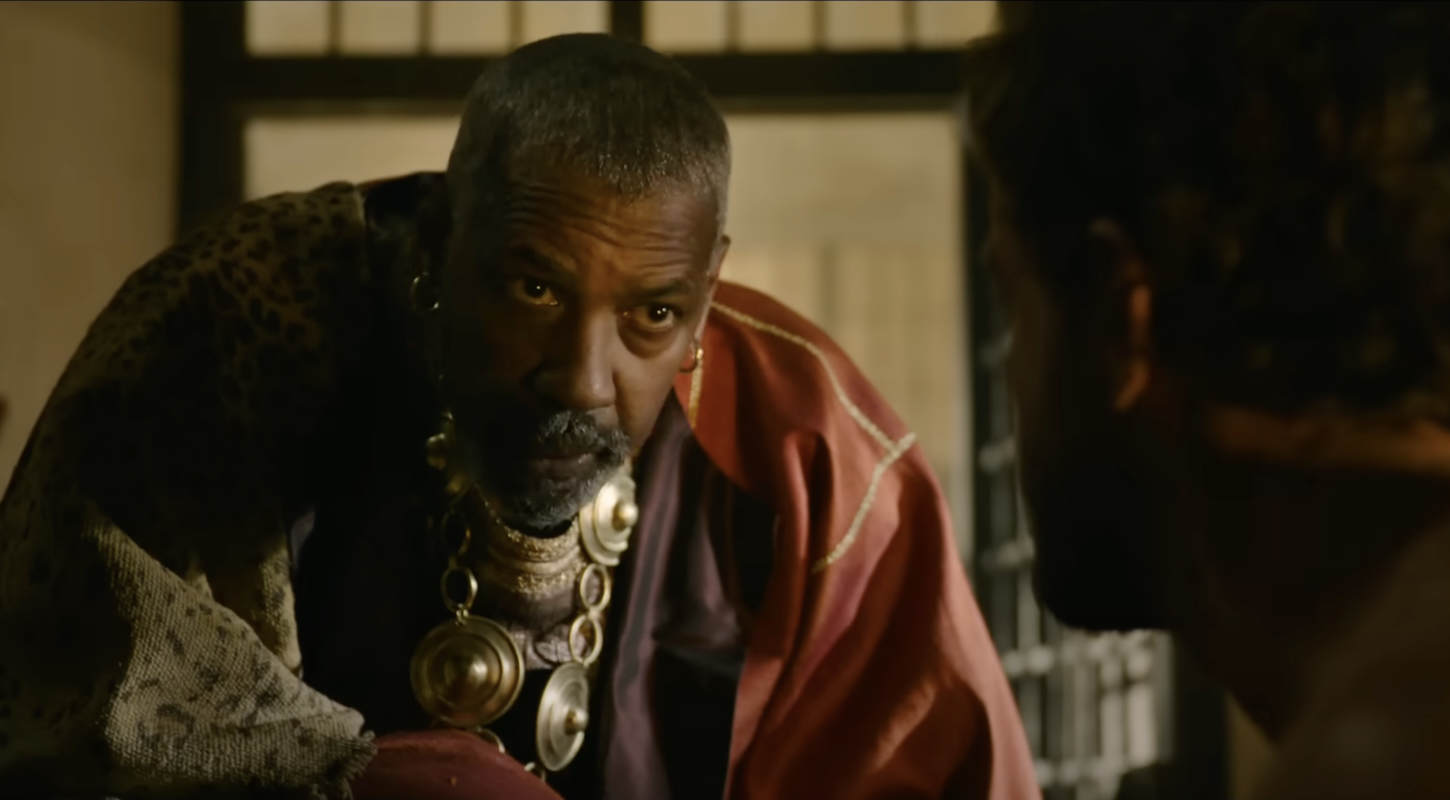Gladiator II, Ridley Scott's sequel to Ridley Scott's Gladiator, is neither a good movie nor a bad movie—instead, it is easily one of the most movies in recent memory. Overstuffed and overacted (these are not complaints, mind you), Gladiator II has so much going on that the presence of (spoilers beyond this point) frickin' sharks in the frickin' Colosseum doesn't even make its Wikipedia summary. But look beyond the excesses of the film—easier said than done, given that a gladiator riding a rhinoceros like a surfboard appears not even halfway through—and there's another story here, one about how the politics of these films changed dramatically between the 2000 original and its 2024 sequel, and what that change says about the stories that America can still believe about itself.
In Gladiator, Rome is a civilizing force (the opening battle is a victory over barbarian tribes), and is on the verge of peacefully transitioning back to a republic. This version of Rome is a fundamentally virtuous nation that is threatened when Commodus, a vain and selfish degenerate, takes the reins of power instead of Maximus, the Cincinnatus-like humble general chosen by the dying emperor to return republicanism to the empire, who is subsequently exiled. It is essentially a late–Clinton-era narrative about America: A proud state has been brought low by the peccadillos of a flagrantly libertine leader who habitually disrespects the military, and the only way to return the nation to glory is for a morally upstanding political outsider (not one of those hated "career politicians") to defeat and remove this dishonorable interloper. And when Maximus completes his task and lays dying—term limited by Commodus's dagger—he demands that power be returned to the Senate. Even in death, Maximus was an institutionalist.
Fast-forward to 2024, and we have a very different Rome portrayed in the sequel. Similar to the first movie, this one opens with a Roman battle—in this case, however, it is part of a war of colonial aggression against a nation that is religiously tolerant, multi-ethnic, and free. As such, the Romans are framed from the jump as the villains of the story, and we are subsequently shown Rome as a corrupt and exploitative empire, leveraging its professional military—its one remaining competent institution—to pillage loot for the decadent imperial core. Then, as now, the victims of all of this are unseen by those their pain makes wealthy.
Politically, this Rome is run jointly by two emperors, Geta and Caracalla, in an apparent effort not to replace Commodus, but to recreate him in the aggregate. Geta is sexually fluid and constantly anxious; Caracalla is very dumb and clinically insane. They differ superficially, but both share a love of state-mandated violence and imperial conquest, and each are incompetent in their own ways. This may or may not be a metaphor for the American two-party system.
The real power in Rome lies behind the throne, with the gladiator-keeper and arms dealer Denzelus Washingtonius Macrinus, a former prisoner of war turned wealthy merchant of death. Possessing Al-Pacino-in-Heat energy and always seemingly on the verge of throwing out a "My man!" in his scenes, Macrinus delights in finding and probing all of the cracks in this broken society. Though aesthetically distinct from the man himself, Macrinus is Rome's Trump: the grasping destructive void that debauched empires inevitably produce.
Disdainful of the existing power structure even as it consistently rewards and protects him; striving to destroy an unjust system in service of replacing it with something equally unjust but even more directly centered on himself; constantly switching between glad-handing charm, curdled cynicism, and barely concealed menace—Macrinus might as well be doing Trump's accordion hands under the ample sleeves of his toga. And like Trump, Macrinus proves himself more capable than any of his nominal rivals not through sophisticated manipulation but by brute-forcing himself through the weak spots in the decrepit remnants of his country's political system. The only difference between the two that I can discern is that when Macrinus stands in the middle of the Colosseum and shoots somebody, there are consequences.
The death of the villain in the first film was an affirmation of a familiar kind of American exceptionalism: We were once the city on a hill—a society so powerful and good as to be an example to the rest of the world; this was the "dream of Rome" to Gladiator's version of Marcus Aurelius—and we can be so again if moral men do what is right. Gladiator II has no space for such myth-making, not after what we've learned about ourselves in the interim. The exceptionalism that is articulated in the new film is not about national virtue, but of free-market opportunism—a different but no less valid national narrative, where anyone with the will and the cunning can go from rags to riches in this great land of opportunity. Macrinus himself identifies this as the defining characteristic of Rome, and his rise demonstrates the weakness of such a society, where the money gained through his deceit and viciousness is used to corrupt, seize, and ultimately destroy any institutional power that could bind him.
To have a new Maximus sacrifice himself for this version of Rome would be absurd; like Joe Biden, he would be dying in service of restoring a status quo that was long ago discarded as a failure. Times are dire, new heroes are needed, and sequels gotta give the people more—so Gladiator II has II protagonists instead of I, and instead of a general-turned-slave, we have one of each. The general is Acacius, who, like Maximus, is a battle-weary servant of Rome and also a wife guy; the slave is Lucius, who is revealed to be Maximus's son in a thoroughly telegraphed plot twist.
Despite Acacius being a renowned leader, a member of the upper classes (through his wife, Lucilla), and an expert in the art of war, he utterly fails in his attempt to work within existing systems to stop the degradation of Rome. In such an empire, elites and institutions simply cannot be relied upon to police themselves; they are either too personally compromised or too wedded to the system of subjugation and extraction that produced them to effectively challenge the regime's turn to full fascism. Acacius's death is appropriately Looney Tunes–esque.
By contrast, Lucius refuses to bend the knee, either to the disgusting brother-emperors or to his own high-born mother. He also eschews working the system to gain power like Macrinus, or retreating from the conflict like the retired gladiator he befriends. Instead, he leads a successful slave revolt and then engineers a Battleship Potemkin–style resolution between the army loyal to Acacius and the army loyal to Macrinus, uniting the military in the cause of stamping out the corruption of Roman elites. In between acts of class solidarity, Lucius kills Macrinus—because of course he does—but unlike in the first movie there is no sense that simply killing the bad man is sufficient to solve the problem, and the film ends on a note of ambiguity.
Gladiator II serves as both an extension of Gladiator's story, and also as a belated rejection of the myth of national greatness at Gladiator's core. The lesson of this movie is that only by emphatically discarding that myth—and considering Rome/America for what it really is and has become—can we credibly defeat the cynical opportunism and creeping fascism that fill the void left behind when the narrative of exceptionalism is discredited. Institutions will not save us, all we have is each other, and we must either embrace one another or become just another body lying in the dust of the arena.
Oh, and also: To kill a feral baboon, you have to become a feral baboon. That was another lesson of this movie.






